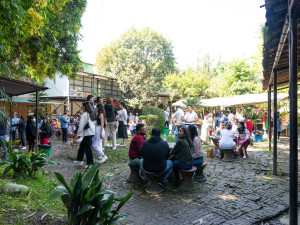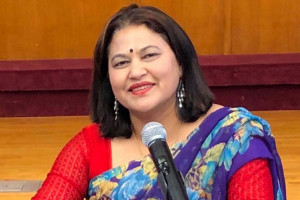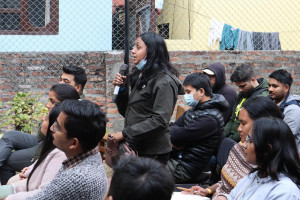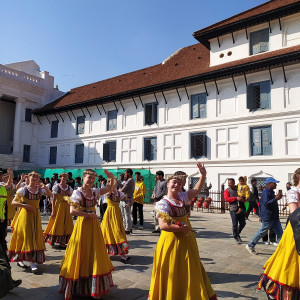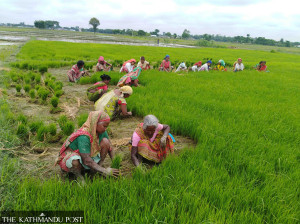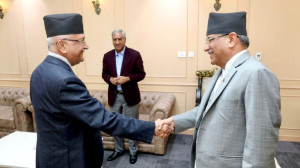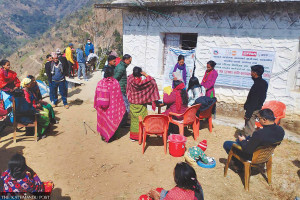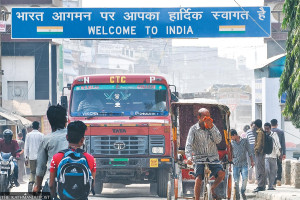 16.12°C Kathmandu
16.12°C KathmanduCulture & Lifestyle
The liver transplant specialist
Dr Ramesh Singh Bhandari’s successful career is characterised by a commitment to medical excellence, all the while striving to make life-saving liver transplants more accessible.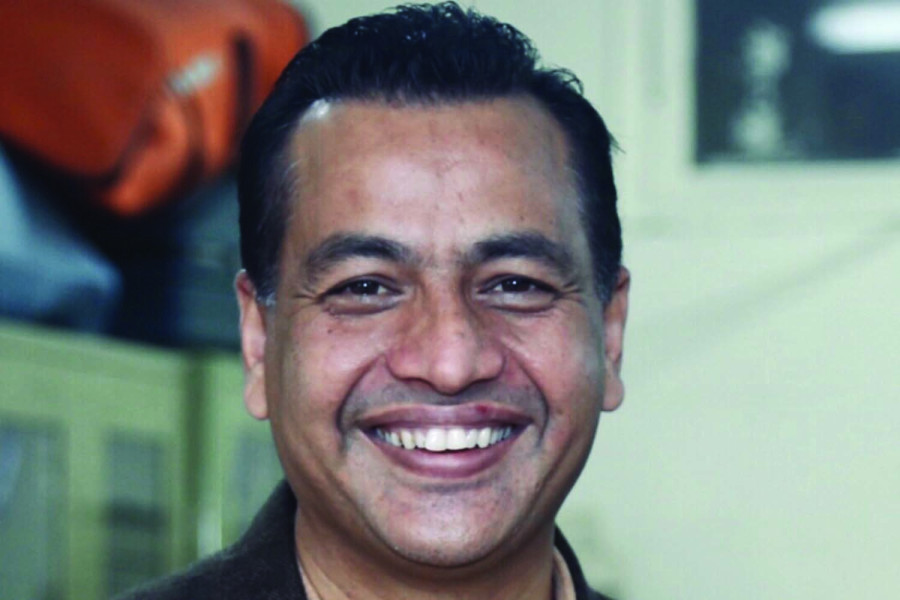
Anish Ghimire
The path from childhood dreams to adult career choices can be a winding one. Dr Ramesh Singh Bhandari, like many of us, was once a child with dreams of flying planes or becoming a famous actor. Born in Baitadi, he came to Kathmandu at the age of five. Growing up in the capital, he developed a fondness for two different art forms—music and sports. For a long time, he couldn’t envision a life outside these two pursuits. However, guided by his faith, he eventually took a different path—one that led him away from his childhood aspirations and towards a career as a surgeon.
In later years, he achieved remarkable milestones, such as leading a team dedicated to establishing living donor liver transplants in Nepal, attaining a professorship, and receiving recognition from the president. Most importantly, he finds contentment in the way his life has unfolded. Even as he accomplished all these feats, he continued to indulge in his love for football, playing every week, and pursued his passion for music, recording songs that brought joy to his inner child.
Once Bhandari arrived in Kathmandu, he enrolled in VS Niketan Secondary School, where he discovered his proficiency in three things—academics, singing, and sports. However, his family either failed to notice or chose to overlook his talents in singing and sports, instead emphasising academics. This was a common practice during those days when career options were limited. Driven by these circumstances, he decided to pursue a career in medicine. In 1993, after completing his School Leaving Certificate (SLC, now SEE), he joined Birendra Sainik Awasiya Mahavidyalaya (now Sainik Awasiya Mahavidyalaya) to study biology. Reflecting on his time at the college, he recalls, “During those two years, I not only focused on academics but also learned the value of punctuality and discipline, which have stayed with me.”
With the goal of being a doctor firmly in his sights, Bhandari set off to Dharan in 1995 to study medicine at BP Koirala Institute of Health Sciences (BPKIHS). However, he had not yet determined his specific medical career path. It wasn’t until 2001, as he neared the completion of his MBBS at BPKIHS, that he felt drawn to paediatrics.
“At that moment, pursuing a career as a paediatrician felt like the right choice, so I decided to follow that path,” he says. After obtaining his MBBS, he briefly worked in the paediatric department at Kathmandu Medical College (KMC). However, fate intervened when he was unable to secure a place on the merit list for the paediatrics entrance exam, leading him to choose the second option—surgery. He reflects on this turn of events with a smile, saying, “But I had no regrets. I had made a commitment to myself that whatever I do, I would give it my best.”
After making his decision, Bhandari enrolled at Tribhuvan University Teaching Hospital (TUTH) to pursue an MSc in Surgery. During his studies there, he noticed an unusual aspect within gastrointestinal (GI) surgery—liver operations were relatively rare and not widely discussed. This peculiarity caught his attention, prompting him to specialise in the field and devote special attention to liver treatments.
Upon completing the three-year master’s programme, Bhandari assumed roles as an assistant lecturer and surgeon at the same hospital in the year 2006. Over time, he recognised not only his personal passion for liver surgery but also the urgent need to advance this field in Nepal. In September 2010, he embarked on a journey to Melbourne, Australia, to participate in a surgery fellowship programme at Alfred Hospital. After a year in the programme, he returned to Nepal. Three years later, he returned to Melbourne, this time to pursue his long-cherished dream of studying liver transplants. Bhandari recalls, “I enrolled at Austin Hospital through a scholarship programme, and my sole motive was to bring liver transplants to Nepal.”
He underwent a year of intensive training there. Upon returning, he immediately commenced his research and initiated the process of building a dedicated team to turn his dream into reality. Bhandari acknowledges the challenges, stating, “Starting a new medical practice in any field is a formidable task because it necessitates assembling a proficient team, securing funding, establishing a support network, and, most importantly, training skilled professionals.”
In the initial phases of team building, many team members pursued education abroad to specialise in liver transplants. It took two to three years to assemble a capable team, secure the necessary budget (amounting to Rs110 million provided by the health ministry), and garner the support of Apollo Hospital in New Delhi, which later collaborated with the TUTH team to conduct these groundbreaking surgeries. Once all preparations were in place, the team embarked on the search for suitable patients.
As Bhandari’s team was preparing for their first surgery, a team of surgeons from Samsung Medical Center, South Korea performed the first successful living donor liver transplant alongside a local team of surgeons from Human Organ Transplant Center (HOTC), Bhaktapur in 2016.
Finally in 2019, a father-daughter pair arrived at TUTH to undergo the transplant procedure. The daughter, aged 33, selflessly donated a part of her liver to her 58-year-old father, who was battling cirrhosis. Fortunately, the surgery was a success. The donor spent two days in the Intensive Care Unit (ICU) and a subsequent week in the post-operative ward before being discharged. Meanwhile, the recipient was released after a three-week stay in the hospital.
To date, Bhandari’s team at TUTH has completed ten liver transplants. There is a legal requirement that limits donors to close relatives. However, Bhandari explains that a thorough medical evaluation, lasting two to three weeks prior to surgery, involves examining the blood group and liver anatomy of both the donor and recipient. After meeting both legal and medical criteria, the transplant process proceeds. Typically, 30 percent of the donor’s liver should remain, and it regenerates over time, returning to its standard size within six to eight weeks. When asked about the total cost, Bhandari notes, “It ranges from Rs2.5 to 3 million, which is considerably more affordable than seeking treatment abroad.”
The transplant procedure follows a straightforward routine. Surgery begins early, usually around 7 am and both the donor and recipient surgeries occur simultaneously, side by side. Fourteen to fifteen hours later, the procedures are completed. A dedicated team comprising 40 to 50 medical professionals, including doctors and nurses, collaborates throughout the surgical process. Donors typically recover within eight to ten days, while recipients require two to three weeks. “Due to the complexity of the transplant procedure, we initiate planning weeks or even months in advance,” Bhandari explains.
The year 2019 marked a significant turning point in the surgeon’s life. It was a memorable year when he accomplished his first successful liver transplant and was also appointed as a professor in the gastrointestinal surgery department at TUTH. During that same year, a noteworthy event unfolded as then-Prime Minister KP Sharma Oli required treatment for ruptured appendix, and Bhandari took on a leadership role in this medical procedure. This responsibility required him to be in close proximity to the Prime Minister during most of his treatment sessions.
In an unassuming moment, Bhandari shared some of the cover songs he had posted on his social media with Oli. Oli’s response was both encouraging and motivating. Bhandari recounts, “He inspired me to record songs and pursue music more professionally.” Fueled by this encouragement, he decided to take one of Oli’s poems titled ‘Bancha Namuna Nepal’ and transform it into a song with the same name. To date, he has recorded ten songs, all of which are available on his YouTube channel.
Beyond his musical pursuits, Bhandari is an active participant in marathons and has established a futsal club with fellow doctors, engaging in weekly matches. The doctors in his team work at various medical institutions, including Grande Hospital, HAMS Hospital and KMC Hospital. Bhandari emphasises the positive impact of sports, stating, “Engaging in sports instils discipline, and it’s always enjoyable to pursue your passions.”
Bhandari’s dedication to liver transplant surgery earned him the ‘Prabal Jana Sewa Shree Tritiya’ award from President Bidya Devi Bhandari in 2021. He remains optimistic that more patients will consider liver transplant surgery at the hospital in the near future. Expressing his goals, he says, “We wanted to conduct a minimum of two transplants each month, but we're falling short of our expectations.” Many patients still opt to seek transplants abroad, particularly in New Delhi. Bhandari remarks, “We have consistently achieved successful transplant outcomes, yet we continue to face challenges in attracting more patients.” In addition to the services provided by the Tribhuvan University Teaching Hospital, the Human Organ Transplant Centre and Chitwan Medical College also offer transplant services with the assistance of foreign doctors.




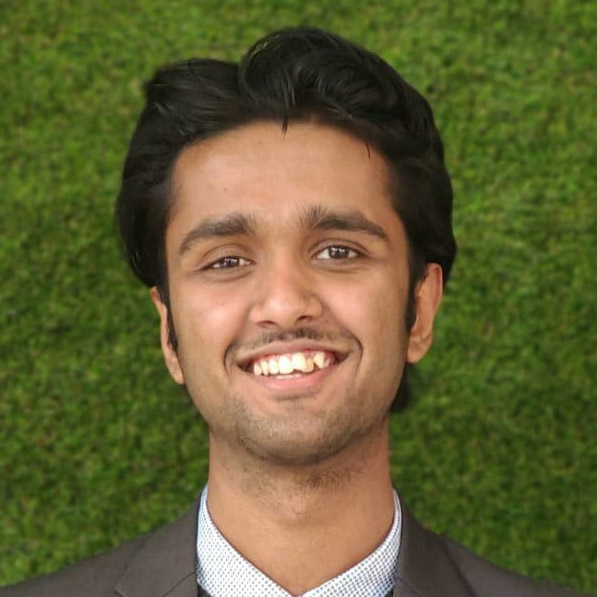
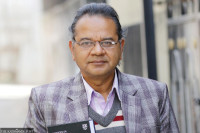

.jpg&w=200&height=120)




